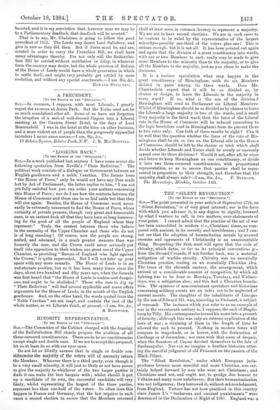MINORITY REPRESENTATION.
[To THE EDITOR OF THE "SPECTATOR."] .SIR,—The Committee of the Cabinet charged with the framing of the Redistribution Bill clearly propose the abolition of all three-cornered constituencies. There are to be no constituencies except single and double ones. If we are to accept this proposal, let us at least do so with our eyes open.
Do not let us blindly assume that in single or double con- stituencies the majority of the voters will of necessity return the Members. Wherever there is a third party, even though it be a very small minority, it will just as likely as not have power to give the majority to whichever of the two larger parties it finds it can make the best bargain with ; whilst should it put up a candidate of its own, the successful candidate will very likely, whilst representing the largest of the three parties, represent less than one-half of the voters. So often does this happen in France and Germany, that the law requires in such eases a second election to secure that the Members returned
shall at least seem in common decency to represent a majority. We are not to have second elections. We are in such cases to be content to be ruled by the representative of the largest minority—possibly one-third of the voters plus one ! This is serious enough, but it is not all. It has been pointed out again and again that the division of a great constituency into wards, with one or two Members to each, really may be made to give more Members to the minority than to the majority, or to give all the Members to the majority, just as you chose to make the divisions.
It is a curious speculation what may happen in the great constituency of Birmingham, with its six Members divided in pairs among its three wards. Does Mr. Chamberlain expect that it will be so divided as, by chance or design, to leave the Liberals in the majority in every ward ? If so, what is the use of the division ? Birmingham will send to Parliament six Liberal Members- Whilst if Birmingham should be so divided as by chance to leave the Liberals a large majority in two of the wards, and a small Tory majority in the third ward, then the force of the Liberal vote in the House of Commons will be reduced (according to the logic heretofore used in Birmingham) from its present three to two votes only. Can both of these results be right ? Can it be well that the question whether the force of the vote of Bir- mingham shall be six or two on the Liberal side in the House of Commons, should be left to the chance or trick which shall decide whether Liberals and Tories shall be evenly or unevenly spread over its three divisions ? Would it not, after all, be wiser and better to keep Birmingham as one constituency, or divide it into two three-cornered constituencies, with proportional representation, so as to secure that parties shall be repre- sented in proportion to their strength, and therefore that the


































 Previous page
Previous page